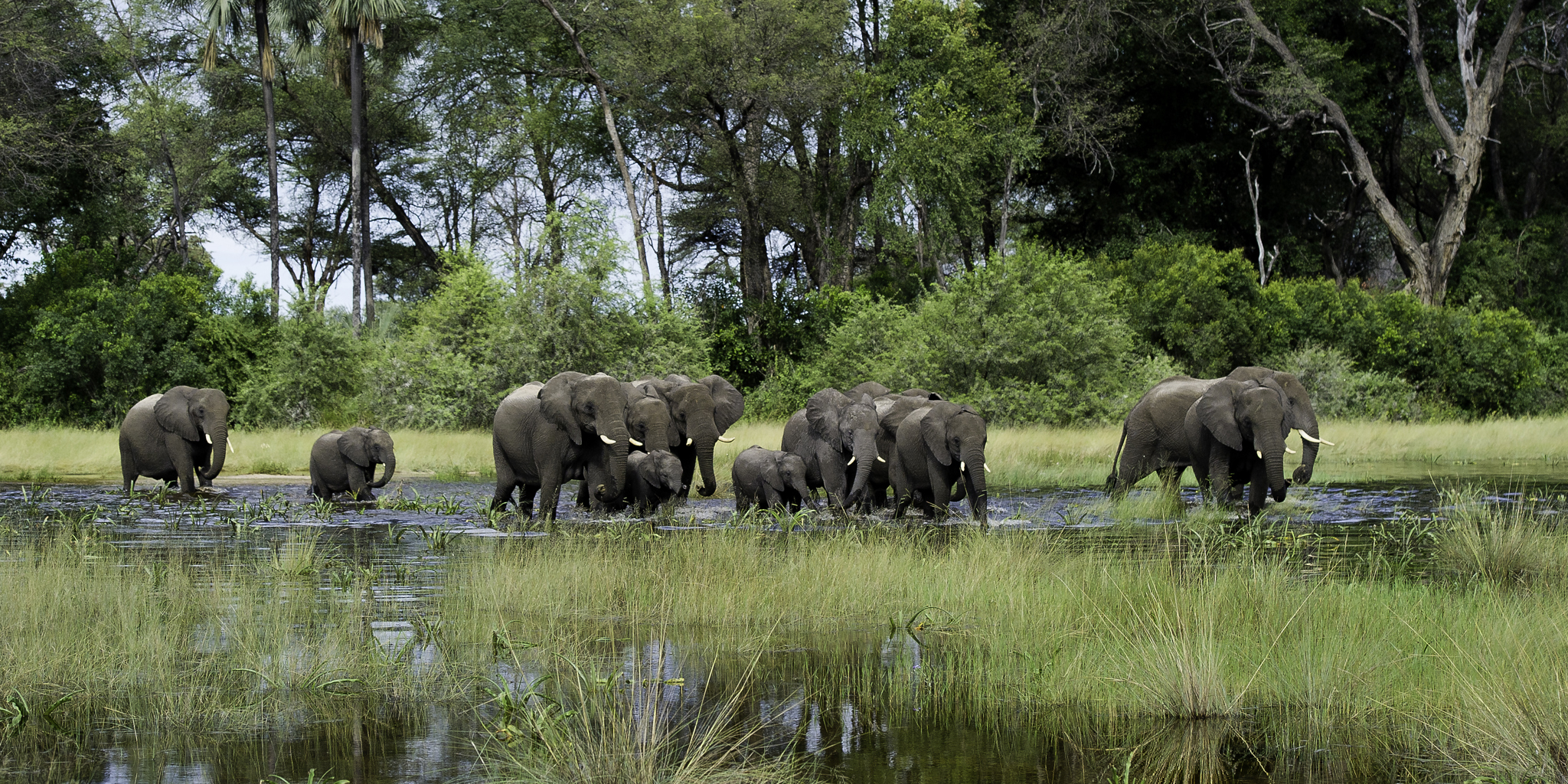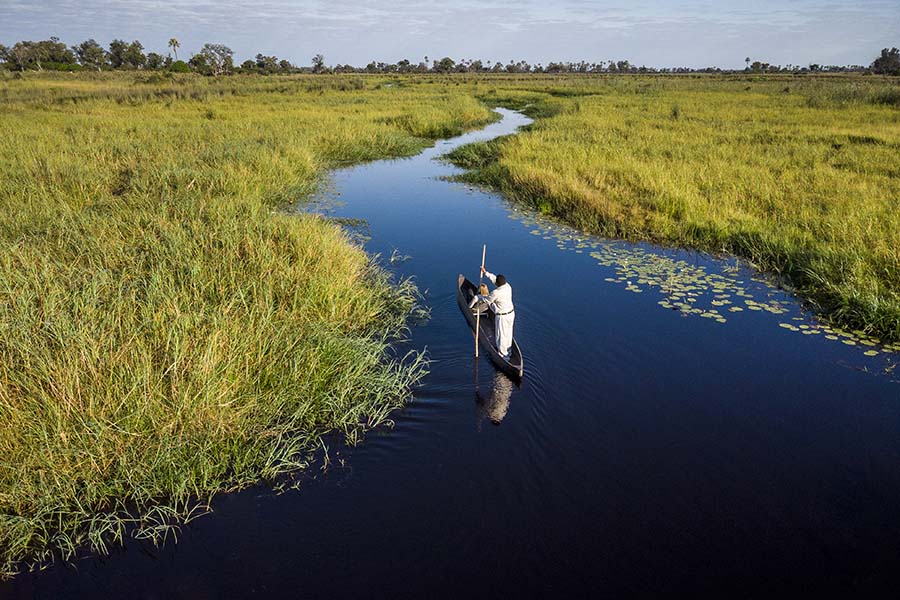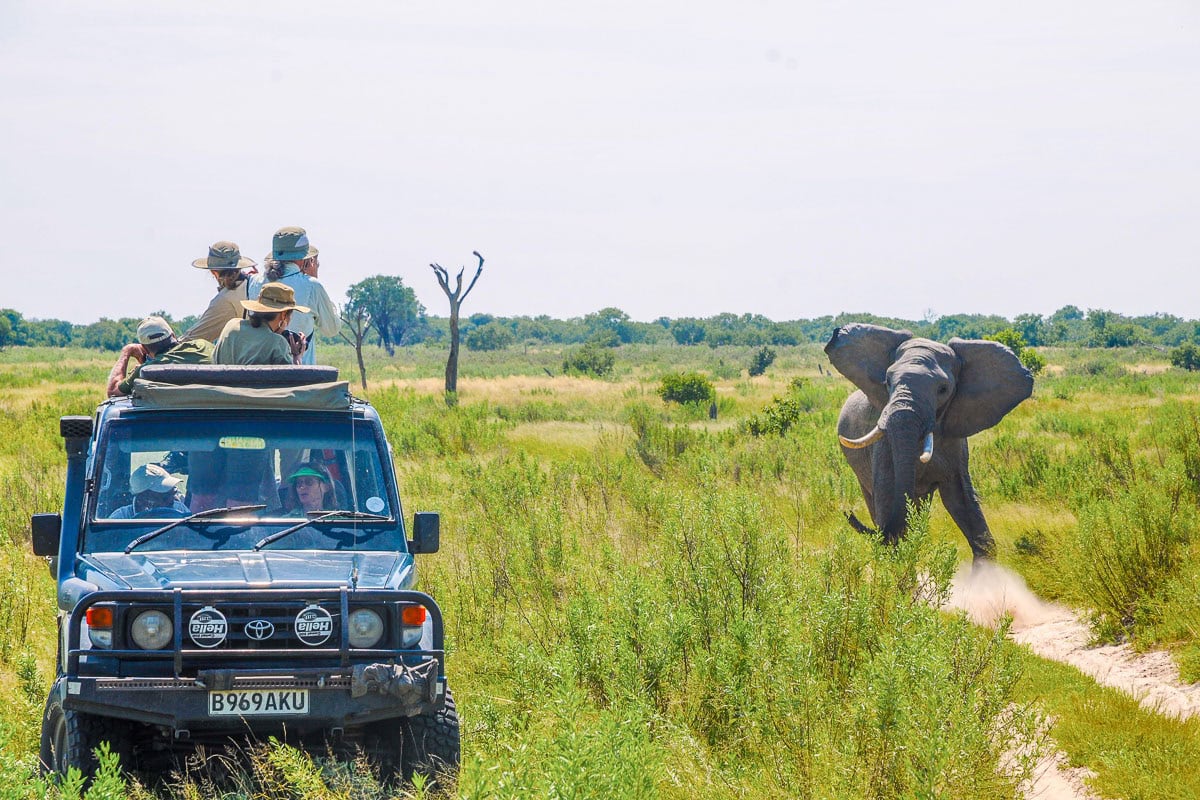Experience the Wonders of the Okavango Delta with Expert Botswana Tours

Introduction
Overview of the Okavango Delta
The Okavango Delta, a UNESCO World Heritage Site, is one of the largest inland deltas in the world. Located in Botswana, this unique oasis supports an astonishing array of wildlife and plant species, making it a haven for nature enthusiasts and adventure seekers alike. Every year, seasonal floods transform this dry landscape into a vibrant tapestry of wetlands, lagoons, and islands.
Key features of the Okavango Delta include:
- Diverse Ecosystem: Home to over 1,500 species of plants and an impressive variety of wildlife, from elephants and lions to rare birds and aquatic life.
- Biodiversity Hotspot: The delta is recognised for its rich biodiversity, with ecosystems ranging from permanent swamps to seasonal floodplains.
- Cultural Significance: It is also the heartland of the indigenous Bayei people, who have lived in harmony with the land for centuries.
Importance of Botswana Tours
Exploring the Okavango Delta through organised Botswana tours offers an unparalleled way to experience this natural wonder. The tours are designed not just for leisure but also to promote environmental awareness and cultural appreciation. Here are several reasons why these tours are essential:
- Expert Guidance: Knowledgeable guides provide insightful information about the ecology and wildlife, enhancing the tour experience.
- Safety: Travels through remote areas are carefully managed to ensure traveller safety while maximising wildlife viewing opportunities.
- Local Involvement: Tours often support local communities, promoting practices that empower residents and preserve their traditions.
Joining a Botswana tour is more than a sightseeing expedition; it's an opportunity to connect deeply with one of the planet’s most extraordinary ecosystems and its vibrant cultures.

Exploring the Wonders of the Okavango Delta
Unique Ecosystem of the Delta
The Okavango Delta is renowned for its extraordinary ecosystem, where land and water seamlessly intertwine to create a vibrant habitat. It is one of the largest inland deltas in the world, formed by the Okavango River spreading across a vast expanse of the Kalahari Desert. This unique geography leads to a variety of environments, including lush riverine forests, expansive floodplains, and permanent swamps teeming with life.
- Vegetation Variety: The delta boasts over 1,500 plant species, many of which are adapted to the seasonal flooding.
- Microhabitats: These bring together diverse habitats that attract numerous bird and animal species, contributing to the overall ecological richness.
Wildlife Viewing Opportunities
Wildlife enthusiasts flock to the Okavango Delta for unparalleled wildlife viewing opportunities. The delta is home to an incredible array of animals, offering visitors the chance to see creatures in their natural habitats.
Key highlights for wildlife watchers include:
- Big Five Sightings: Lions, leopards, elephants, rhinoceros, and Cape buffalo can often be spotted during game drives and guided walks.
- Birdwatching Paradise: With over 450 bird species, including the rare African pygmy goose and the majestic African fish eagle, the delta is a true paradise for birdwatchers.
- Unique Animal Behaviours: Experts offer insights into the behaviours of various species, enhancing the viewing experience.
Water-Based Activities in the Delta
A defining feature of the Okavango Delta is its extensive waterways, which create a haven for a multitude of water-based activities.
- Mokoro Safaris: These traditional dugout canoe trips allow visitors to glide silently through the waterways while observing wildlife up close.
- Boat Cruises: Enjoying a sunset cruise on the delta waters presents an idyllic opportunity to witness the stunning colours of the African sky as well as the vibrant wildlife that comes to the shore.
- Fishing: The delta is home to several species, including the elusive tiger fish, making it a great destination for anglers.
Engaging in these activities not only enhances the experience but also fosters a deeper understanding and appreciation for the delta’s unique environment. Each moment spent in this ecological wonder reveals the intricate connections between water, land, and life.

Benefits of Expert Botswana Tours
Professional Guidance and Safety
Opting for expert Botswana tours ensures that visitors receive professional guidance, an essential aspect when navigating the wonders of the Okavango Delta. Experienced guides not only lead the way but also interpret the intricate dynamics of the ecosystem, enriching the overall experience.
- Expert Knowledge: Guides are trained in wildlife behaviour, ecology, and local cultures, helping visitors make the most of their adventure.
- Safety Measures: Travelling in wildlife-rich areas can be unpredictable. Professional operators have established safety protocols to manage encounters with animals and navigate challenging terrains.
This level of expertise allows participants to focus on immersing themselves in the breathtaking experiences the delta offers, safe in the knowledge that they are in capable hands.
Cultural Immersion and Local Experiences
Botswana tours go beyond mere sightseeing; they offer profound cultural immersion. Visitors can engage with local communities, such as the Bayei people, to learn about their traditions, customs, and ways of life.
- Community Visits: Many tours include visits to local villages, providing opportunities for meaningful exchanges, storytelling, and traditional performances.
- Workshops: Some operators offer activities like bead-making or traditional cooking classes, presenting unique insights into local craftsmanship and cuisine.
These experiences foster deeper connections and respect for the rich cultural tapestry of the region.
Exclusive Access and Accommodations
Another significant advantage of expert Botswana tours is access to exclusive sites and premier accommodations. Many private concessions and lodges set up in remote areas cater specifically to guided groups, promising a more intimate experience.
- Private Reserves: Access to less-trafficked game reserves means enhanced wildlife sightings with fewer crowds.
- Luxurious Lodges: Accommodations often blend comfort and style with eco-friendliness, allowing visitors to relax amidst stunning landscapes.
Such exclusive arrangements elevate the overall travel experience, ensuring that each moment spent in Botswana is memorable and unique. This combination of professional support, cultural engagement, and luxurious offerings makes expert Botswana tours an invaluable choice for any traveller looking to explore the Okavango Delta.
Planning Your Botswana Tour
Choosing the Right Tour Operator
Planning a tour to Botswana is an exciting endeavour, and selecting the right tour operator is crucial for a successful experience in the Okavango Delta. The ideal operator should have a solid reputation for quality service and sustainability.
- Research Reviews: Look for testimonials from previous guests to gauge the operator’s reliability and professionalism. Websites and travel forums provide valuable insights into past experiences.
- Partnerships with Locals: Consider operators who collaborate with local communities and respect conservation practices, enhancing both cultural interactions and ecological sustainability.
A trustworthy tour operator can tailor an itinerary that aligns with your interests and caters to your travel style, ensuring a memorable adventure.
Packing Essentials for the Trip
Packing smartly for a Botswana tour is essential, as the climate and activities can vary significantly. Here’s a useful list of essentials to consider:
- Clothing:
- Lightweight, breathable fabrics for daytime activities
- A warm layer for cooler evenings
- Neutral colours to blend into the environment
- Footwear: Comfortable walking shoes for safaris and flip-flops for relaxation.
- Accessories:
- Binoculars for wildlife spotting
- A wide-brimmed hat and sunglasses for sun protection
- Sunscreen and insect repellent
Being well-prepared can greatly enhance the enjoyment of each adventure.
Understanding the Travel Logistics
Grasping the travel logistics of your Botswana tour is vital for a seamless experience.
- Flight Arrangements: Most travellers typically fly into Maun, the gateway to the Okavango Delta, where many tours begin.
- Transfers: Arrange for pick-ups and transfers from the airport to your lodges or camps, as they can often be remote.
- Transportation Type: Understand whether your tour includes light aircraft transfers for remote lodges or vehicle travel for game drives, as this can impact the overall experience.
By paying attention to these logistics, travellers can ensure that their journey through Botswana is as enriching and smooth as possible, allowing them to fully immerse themselves in the wonders of the Okavango Delta.

Experiencing the Okavango Delta: A Day-by-Day Itinerary
Day 1: Arrival and Orientation
Upon arrival at Maun Airport, excitement fills the air as travellers transition from the hustle and bustle of urban life to the stunning serenity of Botswana’s wilderness. After a warm welcome from your tour operator, the journey continues with a short transfer to your chosen lodge.
- Orientation Session: After settling in, a helpful orientation session gives an overview of your itinerary, safety protocols, and what you can expect in the coming days.
- Relaxation Time: Use the rest of the afternoon to unwind by the lodge's pool or enjoy a guided nature walk around the surrounding area to stretch your legs.
This first day sets the stage for an unforgettable adventure, filled with anticipation for the wildlife and landscapes to come.
Day 2: Safari Adventure in Moremi Game Reserve
The second day kicks off early with a thrilling safari adventure in the Moremi Game Reserve, a gem of the Okavango Delta.
- Game Drive: Experienced guides take you through the park, showcasing the extraordinary wildlife that inhabits this region. Expect to see elephants, lions, leopards, and an array of antelope species.
- Bush Breakfast: Enjoy a delightful bush breakfast served in the wild, a remarkable experience to savour local delicacies surrounded by the sounds of nature.
This immersive experience reinforces the beauty and majesty of Botswana’s wildlife, making it a highlight of the trip.
Day 3: Mokoro Excursion in the Delta
Day three introduces a unique perspective on the Okavango Delta with a mokoro excursion.
- Traditional Canoeing: Glide silently through the crystal-clear waterways in a traditional dugout canoe, guided by local polers who share their extensive knowledge of the ecosystem.
- Wildlife Spotting: This water-based adventure provides fantastic opportunities to see hippos, crocodiles, and an array of birdlife, allowing for close encounters with nature.
The tranquillity of the mokoro experience contrasts beautifully with the excitement of the previous day's safari.
Day 4: Cultural Village Visit and Sunset Cruise
The final day offers a rich cultural immersion alongside the breathtaking landscapes of the delta.
- Cultural Village Visit: Engage with the local community, learning about traditional lifestyles, crafts, and customs. Participate in activities such as pottery making or traditional dance, which deepens appreciation for the local culture.
- Sunset Cruise: As the day winds down, relax on a sunset cruise, sipping a drink while witnessing the delta's vibrant colours as the sun sets over the water.
This day encapsulates the essence of Botswana: a harmonious blend of adventure and cultural connection, leaving travellers with lasting memories of the beauty and richness of the Okavango Delta.
The Sustainable Tourism Practices in the Okavango Delta
Conservation Efforts in the Region
The Okavango Delta stands as a beacon of conservation, with numerous initiatives designed to protect its unique ecosystem. Various organisations collaborate with the government and local stakeholders to ensure the long-term sustainability of the delta.
- Protected Areas: The delta is largely defined by its protected areas, including the Moremi Game Reserve and the Okavango Delta World Heritage Site, which safeguard its biodiversity.
- Anti-Poaching Initiatives: Continuous efforts are made to combat poaching, employing dedicated teams that work to monitor and protect vulnerable animal species.
These conservation efforts are crucial, not only in preserving the ecological balance but also in ensuring the survival of endangered species, such as the African wild dog and rhinos.
Community Involvement and Empowerment
Local communities play an integral role in the preservation of the Delta, combining traditional knowledge with modern conservation strategies. Many tourism companies actively involve local communities in their operations.
- Job Creation: Sustainable tourism provides employment opportunities for residents, empowering them economically while promoting the conservation of their land.
- Cultural Sharing: Tourists often have the chance to engage with local culture, participating in crafts or activities that foster appreciation for the community’s heritage.
This engagement enhances the visitor experience while ensuring that the benefits of tourism are shared with those who live in and around the delta.
Responsible Tourism Guidelines for Visitors
Visitors to the Okavango Delta are encouraged to adopt responsible tourism practices that contribute to the sustainability of the region. Here are some guidelines to consider:
- Leave No Trace: Always follow the principle of minimal impact by not littering or disturbing wildlife.
- Support Local Businesses: Choose accommodations and tour operators that prioritise sustainability and community involvement.
- Respect Wildlife: Maintain a safe distance from animals and avoid feeding them, as this disrupts their natural behaviours.
By embracing these practices, visitors can enjoy the beauty of the Okavango Delta responsibly, contributing to its preservation for future generations. Each trip not only enriches the traveller's experience but also supports ongoing conservation and community empowerment efforts, highlighting the symbiotic relationship between tourism and sustainable practices in this remarkable ecosystem.

Capturing Memories: Photography Tips in the Delta
Best Spots for Wildlife Photography
The Okavango Delta teems with wildlife and offers a plethora of prime locations for capturing stunning photographs. Among the best spots to consider are:
- Moremi Game Reserve: Renowned for its rich biodiversity, the reserve is ideal for photographing big game, including elephants and lions, particularly during the golden hours of early morning and late afternoon.
- Chief’s Island: This prominent area within the delta frequently hosts a variety of wildlife, from grazing herbivores to predators. It’s a hotspot for dynamic action shots.
- Waterways and Lagoons: The serene waters of the delta provide unique opportunities to capture reflections of animals and dramatic sunsets, creating a stunning backdrop for wildlife shots.
These locations, rich in diverse ecosystems, enable photographers to encapsulate the beauty of the delta.
Equipment Recommendations
When preparing to photograph the Okavango Delta, choosing the right equipment is crucial for quality results. Here are some recommendations:
- Camera: A DSLR or mirrorless camera with a fast autofocus system will effectively capture wildlife in action.
- Lenses: A telephoto lens (at least 300mm) is essential for close-ups of distant animals, while a wide-angle lens can be useful for landscape shots.
- Tripod or Monopod: For stability, particularly during low-light conditions, having sturdy support is advisable.
- Waterproof Gear: Given the wet environments of the delta, using weather-sealed equipment or protective covers will keep gear secure.
Bringing the right equipment enhances the chances of capturing memorable images.
Light and Composition Techniques
Mastering light and composition can truly elevate your wildlife photography. Here are a few techniques to consider:
- Golden Hour: Leverage the soft, diffused light during sunrise and sunset for enchanting images that highlight the delta's colours and textures.
- Rule of Thirds: Positioning your subject off-centre while using the rule of thirds can create more dynamic and engaging photographs.
- Focus on Eyes: Capturing animals with a sharp focus on the eyes can convey emotion and connection, making the viewer feel more engaged.
- Use Leading Lines: Incorporate natural lines, such as rivers or tracks, to lead the viewer’s eye into the image, creating depth and context.
These techniques encourage creativity and help in telling a compelling story through each photograph. With a bit of planning and practice, capturing the enchanting moments in the Okavango Delta can lead to stunning visual memories of this remarkable destination.

Conclusion and Reflection
Highlights of the Botswana Tour
The Botswana tour through the Okavango Delta is brimming with unforgettable highlights that leave an indelible impression on every traveller. From the moment one arrives in Maun and ventures into the breathtaking landscapes of the delta, an adventure filled with awe unfolds at every turn. Some noteworthy experiences include:
- Diverse Wildlife Encounters: The thrill of spotting the "Big Five" up close, alongside many other species, is an unforgettable aspect of this journey. The sheer scale and beauty of elephants wandering through the bush or lions lounging in the shade create lasting memories.
- Mokoro Excursions: Paddling through tranquil waterways on a mokoro provides a unique and intimate connection to the environment, offering a perspective that is both serene and exhilarating.
- Cultural Engagement: Interactions with local communities add depth to the travel experience, revealing rich traditions and lifestyles that are both fascinating and enlightening.
Each of these highlights contributes to a holistic experience that combines nature, adventure, and culture.
Personal Insights and Recommendations for Future Travellers
For those planning to explore Botswana, a few insights can enhance your journey:
- Plan Early: Book your tours and accommodations well in advance to secure your place in popular lodges and camps, especially during peak seasons.
- Stay Open-Minded: Be flexible with your itinerary. Wildlife sightings can be unpredictable, and allowing for spontaneity can lead to unexpected treasures.
- Embrace Local Cuisine: Take the opportunity to sample traditional dishes; local food can provide yet another layer of cultural immersion.
By keeping these recommendations in mind, future travellers can enrich their experience in this incredible part of Africa. The Okavango Delta’s unparalleled beauty and dynamic ecosystems promise an adventure that resonates long after the journey concludes, reminding visitors of the importance of conservation and the breathtaking wonders of nature.
